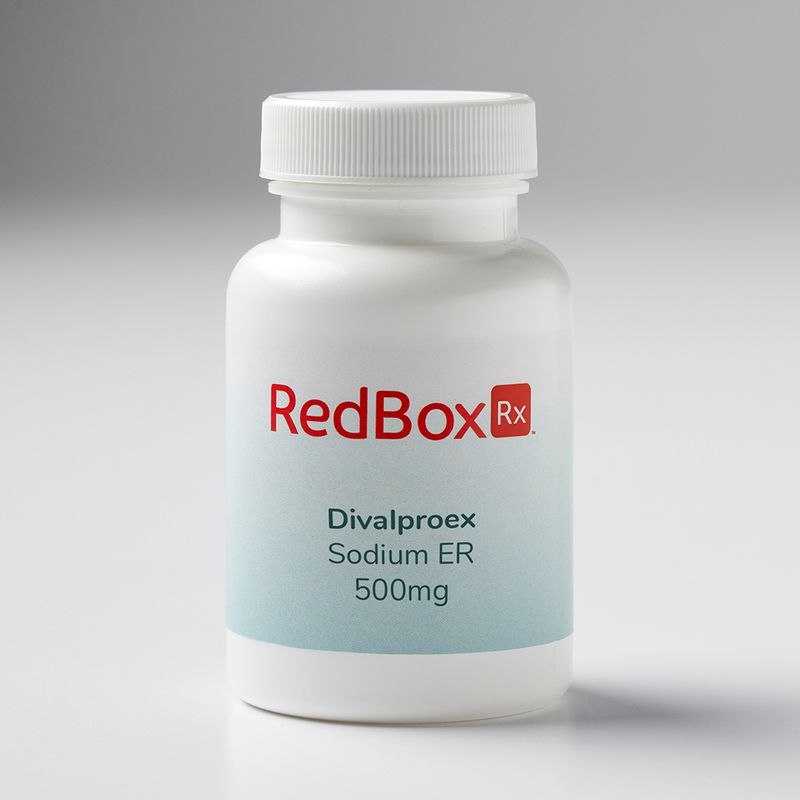Divalproex ER 500 mg Tablet FAQs
-
Valproic acid is used to prevent migraine headaches but not to relieve headaches that have already begun. Valproic acid is in a class of medications called anticonvulsants. It works by increasing the amount of a certain natural substance in the brain.
-
Valproic acid comes as an extended-release (long-acting) tablet to take by mouth, usually once a day. Take valproic acid at around the same time(s) every day. Take valproic acid with food to help prevent the medication from upsetting your stomach. Follow the directions on your prescription label carefully, and ask your doctor or pharmacist to explain any part you do not understand. Take valproic acid exactly as directed. Do not take more or less of it or take it more often than prescribed by your doctor.
Swallow the extended-release tablets whole; do not split, chew, or crush.
Valproic acid may help to control your condition but will not cure it. Continue to take valproic acid even if you feel well. Do not stop taking valproic acid without talking to your doctor, even if you experience side effects such as unusual changes in behavior or mood or if you find out that you are pregnant. If you suddenly stop taking valproic acid, you may experience a severe, long-lasting and possibly life-threatening seizure. Your doctor will probably decrease your dose gradually.
-
Before taking valproic acid,
tell your doctor and pharmacist if you are allergic to valproic acid, any other medications, or any of the ingredients in the type of valproic acid that has been prescribed for you. Ask your pharmacist for a list of the ingredients.
tell your doctor and pharmacist what prescription and nonprescription medications, vitamins, nutritional supplements, and herbal products you are taking or plan to take. Be sure to mention any of the following: acyclovir (Zovirax), anticoagulants ('blood thinners') such as warfarin (Coumadin), amitriptyline, aspirin, carbamazepine (Tegretol), cholestyramine (Prevalite), clonazepam (Klonopin), diazepam (Valium), doripenem (Doribax), ertapenem (Invanz), ethosuximide (Zarontin), felbamate (Felbatol), certain hormonal contraceptives (birth control pills, rings, patches, implants, injections, and intrauterine devices), imipenem and cilastatin (Primaxin), lamotrigine (Lamictal),medications for anxiety or mental illness, meropenem (Merrem), nortriptyline (Pamelor), phenobarbital, phenytoin (Dilantin), primidone (Mysoline), rifampin (Rifadin), rufinamide (Banzel), sedatives, sleeping pills, tolbutamide, topiramate (Topamax),tranquilizers,and zidovudine (Retrovir). Your doctor may need to change the doses of your medications or monitor you carefully for side effects.
tell your doctor if you have or have ever had episodes of confusion and loss of ability to think and understand, especially during pregnancy or childbirth; coma (loss of consciousness for a period of time); difficulty coordinating your movements; human immunodeficiency virus (HIV); or cytomegalovirus (CMV; a virus that can cause symptoms in people who have weak immune systems).
tell your doctor if you are breastfeeding.
if you are having surgery, including dental surgery, tell the doctor or dentist that you are taking valproic acid.
you should know that valproic acid may make you drowsy. Do not drive a car or operate machinery until you know how this medication affects you.
remember that alcohol can add to the drowsiness caused by this medication.
you should know that valproic acid can cause extreme drowsiness that may cause you to eat or drink less than you normally would, especially if you are elderly. Tell your doctor if you are not able to eat or drink as you normally do.
you should know that your mental health may change in unexpected ways and you may become suicidal (thinking about harming or killing yourself or planning or trying to do so) while you are taking valproic acid for the treatment of epilepsy, mental illness, or other conditions. A small number of adults (about 1 in 500 people) who took anticonvulsants such as valproic acid to treat various conditions during clinical studies became suicidal during their treatment. Some of these people developed suicidal thoughts and behavior as early as one week after they started taking the medication. There is a risk that you may experience changes in your mental health if you take an anticonvulsant medication such as valproic acid, but there may also be a risk that you will experience changes in your mental health if your condition is not treated. You and your doctor will decide whether the risks of taking an anticonvulsant medication are greater than the risks of not taking the medication. You, your family, or your caregiver should call your doctor right away if you experience any of the following symptoms: panic attacks; agitation or restlessness; new or worsening irritability, anxiety, or depression; acting on dangerous impulses; difficulty falling or staying asleep; aggressive, angry, or violent behavior; mania (frenzied, abnormally excited mood); talking or thinking about wanting to hurt yourself or end your life; withdrawing from friends and family; preoccupation with death and dying; giving away prized possessions; or any other unusual changes in behavior or mood. Be sure that your family or caregiver knows which symptoms may be serious so they can call the doctor if you are unable to seek treatment on your own.
-
Unless your doctor tells you otherwise, continue your normal diet.
-
Take the missed dose as soon as you remember it. However, if it is almost time for your next dose, skip the missed dose and continue your regular dosing schedule. Do not take a double dose to make up for a missed one.
-
Valproic acid may cause side effects. Tell your doctor if any of these symptoms are severe or do not go away:
drowsiness
dizziness
headache
diarrhea
constipation
changes in appetite
weight changes
back pain
agitation
mood swings
abnormal thinking
uncontrollable shaking of a part of the body
problems with walking or coordination
uncontrollable movements of the eyes
blurred or double vision
ringing in the ears
hair loss
Some side effects can be serious. If you experience any of the following symptoms or those listed in the IMPORTANT WARNING or SPECIAL PRECAUTIONS section, call your doctor immediately:
unusual bruising or bleeding
tiny purple or red spots on the skin
fever
rash
bruising
hives
difficulty breathing or swallowing
swollen glands
swelling of face, eyes, lips, tongue, or throat
peeling or blistering skin
confusion
tiredness
vomiting
drop in body temperature
weakness or swelling in the joints
Valproic acid may cause other side effects. Call your doctor if you have any unusual problems while taking this medication.
If you experience a serious side effect, you or your doctor may send a report to the Food and Drug Administration's (FDA) MedWatch Adverse Event Reporting program online (http://www.fda.gov/Safety/MedWatch) or by phone (1-800-332-1088).
-
Divalproex ER is $20 per month with RedBox Rx, no insurance required and no membership fees.
Our online consultation for migraine & headaches costs only $25.
-
Keep this medication in the container it came in, tightly closed, and out of reach of children. Store it at room temperature, away from excess heat and moisture (not in the bathroom).
Unneeded medications should be disposed of in special ways to ensure that pets, children, and other people cannot consume them. However, you should not flush this medication down the toilet. Instead, the best way to dispose of your medication is through a medicine take-back program. Talk to your pharmacist or contact your local garbage/recycling department to learn about take-back programs in your community. See the FDA's Safe Disposal of Medicines website (http://goo.gl/c4Rm4p) for more information if you do not have access to a take-back program.
It is important to keep all medication out of sight and reach of children as many containers (such as weekly pill minders and those for eye drops, creams, patches, and inhalers) are not child-resistant and young children can open them easily. To protect young children from poisoning, always lock safety caps and immediately place the medication in a safe location - one that is up and away and out of their sight and reach. http://www.upandaway.org
-
In case of overdose, call the poison control helpline at 1-800-222-1222. Information is also available online at https://www.poisonhelp.org/help. If the victim has collapsed, had a seizure, has trouble breathing, or can't be awakened, immediately call emergency services at 911.
Symptoms of overdose may include the following:
sleepiness
irregular heartbeat
coma (loss of consciousness for a period of time)
-
If you have diabetes and your doctor has told you to test your urine for ketones, tell the doctor that you are taking valproic acid. Valproic acid can cause false results on urine tests for ketones.
Before having any laboratory test, tell your doctor and the laboratory personnel that you are taking valproic acid.
Do not let anyone else take your medication. Ask your pharmacist any questions you have about refilling your prescription.
It is important for you to keep a written list of all of the prescription and nonprescription (over-the-counter) medicines you are taking, as well as any products such as vitamins, minerals, or other dietary supplements. You should bring this list with you each time you visit a doctor or if you are admitted to a hospital. It is also important information to carry with you in case of emergencies.
-
Brand names
Depakote® ER
Other names
Divalproex sodium
Valproate sodium
-
Valproic acid may cause serious or life-threatening damage to the liver that is most likely to occur within the first 6 months of therapy. The risk of developing liver damage is greater in children who are younger than 2 years of age and are also taking more than one medication to prevent seizures, have certain inherited diseases that may prevent the body from changing food to energy normally, or any condition that affects the ability to think, learn, and understand. Tell your doctor if you have a certain inherited condition that affects the brain, muscles, nerves, and liver (Alpers Huttenlocher Syndrome), urea cycle disorder (an inherited condition that affects the ability to metabolize protein), or liver disease. Your doctor will probably tell you not to take valproic acid. If you experience any of the following symptoms, call your doctor immediately: excessive tiredness, lack of energy, weakness, pain on the right side of your stomach, loss of appetite, nausea, vomiting,, dark urine, yellowing of your skin or the whites of your eyes, or swelling of the face.
Valproic acid can cause serious birth defects (physical problems that are present at birth), especially affecting the brain and spinal cord and can also cause lower intelligence and problems with movement and coordination, learning, communication, emotions, and behavior in babies exposed to valproic acid before birth. Tell your doctor if you are pregnant or plan to become pregnant. Women who are pregnant or who are able to become pregnant and are not using effective birth control must not take valproic acid to prevent migraine headaches. Women who are pregnant should only take valproic acid to treat seizures or bipolar disorder (manic-depressive disorder; a disease that causes episodes of depression, episodes of mania, and other abnormal moods) if other medications have not successfully controlled their symptoms or cannot be used. Talk to your doctor about the risks of using valproic acid during pregnancy. If you are a woman of childbearing age, including girls from the start of puberty, talk to your doctor about using other possible treatments instead of valproic acid. If the decision is made to use valproic acid, you must use effective birth control during your treatment. Talk to your doctor about birth control methods that will work for you. If you become pregnant while taking valproic acid, call your doctor immediately. Valproic acid can harm the fetus.
Valproic acid may cause serious or life-threatening damage to the pancreas. This may occur at any time during your treatment. If you experience any of the following symptoms, call your doctor immediately: ongoing pain that begins in the stomach area but may spread to the back nausea, vomiting, or loss of appetite.
Keep all appointments with your doctor and the laboratory. Your doctor will order certain lab tests to check your response to valproic acid.
Talk to your doctor about the risks of taking valproic acid or of giving valproic acid to your child.
Your doctor or pharmacist will give you the manufacturer's patient information sheet (Medication Guide) when you begin treatment with valproic acid and each time you refill your prescription. Read the information carefully and ask your doctor or pharmacist if you have any questions. You can also visit the Food and Drug Administration (FDA) website (http://www.fda.gov/Drugs/DrugSafety/ucm085729.htm) or the manufacturer's website to obtain the Medication Guide.
-
We offer a variety of prescription medication options for migraines and headaches including:

Affordable migraine and headache treatment online.
Whether you are looking for preventative or acute treatment of migraines and headaches, RedBox Rx offers FDA-approved prescription medications to get you feeling like yourself again. Your first step towards relief is to start an online consultation with one of our experienced, licensed medical providers.
- No membership or subscription fees.
- Low-cost telehealth consult with a licensed medical provider.
- Divalproex ER for $20 per month.
- Confidential, private and secure.
- Free standard shipping or expedited/overnight available.
Sorry, we’re closed for today. Our U.S. licensed medical providers are available daily 7 a.m. to 9 p.m. CST via live video visit. We look forward to serving you soon. Email us anytime at [email protected].
How RedBox Rx Works
What Our Patients Are Saying
-
“
They made service quick and easy to use. The health information that you complete wasn’t horrible and they did request recent lab work. I completed the information Monday and received my migraine medication on Thurs!
Heather S.
-
“
First time I used RedBox Rx and completely satisfied! I filled out the online consultation which was very thorough and that impressed me. Then less than 24 hours later I had an approval from a doctor for migraine medicine. Having no insurance at this time, this was easy and safe. I will use RedBox Rx again.
Constance W.
-
“
I can't believe the quality of care, not to mention how easy the site is to use! It is by far the best site I've found so far! Thank you RedBox Rx.
Laura K.

Get divalproex ER prescribed online.
Take a 5-minute online assessment, then one of our experienced, licensed medical providers will review and determine whether divalproex ER or another medication is right for you.
Sorry, we’re closed for today. Our U.S. licensed medical providers are available daily 7 a.m. to 9 p.m. CST via live video visit. We look forward to serving you soon. Email us anytime at [email protected].





